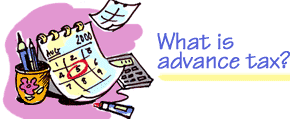|
June 14, 2000
- Banking
- Cards
- General
- Insurance
- Lifestyle
- Loans
- NRI
- Real Estate
- Taxation
- Travel
|

Ganesh Jagadeesh & Co
It is the Income tax including surcharge payable on the estimated income for a year as reduced by rebate under section 88 and any tax deducted/collected at source. The liability for payment of advance tax arises whenever the advance tax payable is Rs 5,000 or more. In the example below, Rs 10,000 is the advance tax that has to be taken care of.
Gross total income: Rs 160,500
Salary (Rs 100,000), income from house property (Rs 48,000), income from other sources (Rs 12,500)
Deductions: Rs 14,500
Section 80D (Rs 2,500), section 80L (Rs 12,000)
Net income: Rs 146,000
Total tax: Rs 15,970
Tax on net income (Rs 20,020) - section 88 rebate (Rs 5,500) + 10 per cent surcharge (Rs 1,452)
Net balance: Rs 10,000
Total tax (Rs 15,970) - TDS (Rs 5,972)
When should it be paid?
In the case of a non-corporate assessee, it should be paid in three installments of the relevant financial year:
- On or before September 15: Up to 30 per cent of the advance tax payable
- On or before December 15: Up to 60 per cent of the advance tax payable
- On or before March 15: Up to 100 per cent of the advance tax payable
Taking the above example, Rs 3,000 by September 15; Rs 3,000 (60 per cent of Rs 10,000 - Rs 3,000) by December 15 and the balance Rs 4,000 by March 15.
How would one calculate it?
A person liable to pay advance tax can pay such tax of his own account without having to submit the estimate of income for the financial year to the assessing authorities. The rates in force for that financial year would be used to compute such tax. Moreover, based on information available on estimated income, a person may from time to time revise the remaining instalment of advance tax after making the first and/or second instalment.
Order issued by the assessing officer
The assessing officer can pass an order requiring a person to pay advance tax on his current year's income specifying the amount of instalments in which such tax is to be paid. For the purpose of calculating the advance tax, the assessing officer may take the higher of the following two amounts:
- The total income of any latest financial year for which the assessment has been completed
- The total income of any subsequent year for which the person has filed a return
The rates of income tax for the current financial year is then applied on the amount ascertained above to determine the advance tax liability.
Assume Bharatbhai has received the assessment order for the return filed for the FY 1997-98 and the total income assessed is Rs 500,000. He has filed a return for the FY 1998-99 with an income of Rs 475,000. During the year 1999-2000 Bharatbhai has not paid any advance tax. The assessing officer issues an order to Bharatbhai in January 2000 requiring him to pay an advance tax of Rs 136,000 by March 15, 2000. The total income considered for the purpose of computing the advance tax is Rs 500,000 (higher of Rs 500,000 and Rs 450,000).
What about revision of the order by the assessing officer?
The assessing officer can revise the order issued earlier by him to enhance or, if you are lucky, reduce the advance tax amount. As in the above case, here too the higher figure is considered for revision of earlier order.
As in the above example, assume Bharatbhai received an assessment order of Rs 500,000 and has not paid any advance tax for the year 1999-2000. Say in November 1999, the assessing officer issues an order requiring Bharatbhai to pay advance tax of Rs 136,000 based on the latest completed assessment of Rs 500,000. In December 1999, Bharatbhai files a return for the FY 1998-99 with a total income of Rs 550,000. The assessing officer may revise his earlier order and require Bharatbhai to pay advance tax of Rs 152,900 based on total income of Rs 550,000.
Know your rights
- The assessing officer cannot issue an order to pay advance tax or revise an earlier order after last day of February of the relevant financial year.
- If a person receiving a notice, feels that his income would be lower than that estimated by the assessing officer, he should send intimation to the assessing officer in Form No. 28A and pay lower tax accordingly. Of course, a higher estimate would be welcome by the income tax authorities, but in such cases no intimation needs to be filed.
Next: Advance tax: default and deferment
Tell us what you think of this information
|
